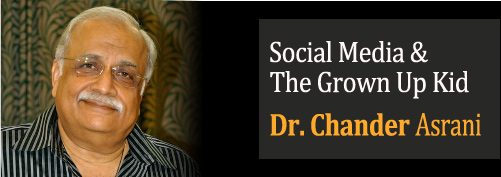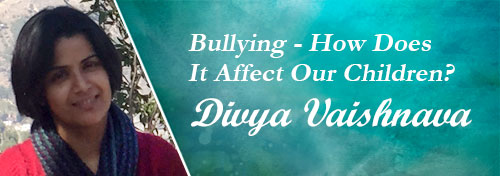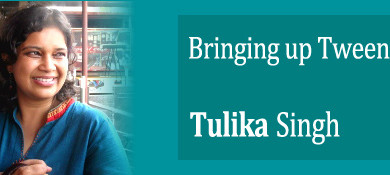Social Media & The Grown Up Kid
I was invited to speak to a group of parents on “handling social media menace”. The research into preparing for the same shook me up; always knew it is a major concern but was not prepared to realize the extent…
Such social media sites offer our teens and adolescent an avenue for entertainment and communication and has been growing exponentially year on year.
For the sake of defining the focus, we included “Any Web site that allows social interaction is a social media site, including social networking sites such as Facebook, Twitter; gaming sites; video sites e.g. YouTube and blogs.”
The most worrying group is 9-17 yr; TV watching and use of one or the other social media site is number 1 after-school activity. Many of the affording class of adolescents (as high as around 50% of 13-to-17 year-olds) have TVs in their bedrooms.
According to a recent survey, around 1/5th of 13-17 group kids browse their favorite social media site more than 10 times a day; what with ‘keep me signed in’ option; over ½ of adolescents visit their profile on social media more than once a day. As high as 75% of this age group now own a cell phone and 25% of them use it for social media; 54% use them for texting (with an enviable speed) or WhatsApp – the latest craze.
Alarmingly, a large part of this generation’s emotional & social development is truly ‘happening’ on the Internet and on their cell phone.
Adolescence, a delicate transition phase wherein a teenager is expected to develop self-confidence and a clear sense of identity; develop new, mature relations with age-mates and begin a phase to achieve emotional independence from parents and other adults; they are inadvertently under threat of potential problems like cyber bullying, sexting (sexually explicit SMS), MMS and other exposure to inappropriate content.
It is prudent that parents are aware that not all of them are healthy environments for children and adolescents. Most of our readers will respond, “Of course, we know” but parents are divided in 3 sub sets when it comes to their awareness of evils of social media.
- Firstly, those who are aware that social media is a potential, multi headed monster (smallest subset);
- Secondly those parents who use technology incredibly well and are comfortable with the online venues that their grown up children are using (second largest sub set) and
- Lastly (and this is the largest subset, at least in India) parents who find it difficult to relate to their digitally savvy off-springs for several reasons; Mostly they lack technical http://humanrightsfilmnetwork.org/topamax abilities or time needed to keep pace with their children in the ever-changing Internet sphere or they lack a basic understanding of these new forms of socialization. The end result is often a technical skill gap between parents and their kids.
It is just not possible to keep today’s youth away from social media as it decidedly has its own advantages. If used judiciously, it helps kids socialize and communicate better. It helps them stay connected with friends and family, make new friends, share pictures and exchanging ideas through groups and focused pages. Parents who encourage kids to blog and podcast are actually teaching them how to take ideas to fruition.
Several schools successfully use blogs as teaching tools; with the benefit of better skills in written English and creativity. If guided well, students can use social media to connect with one another on homework and projects related communication. Several schools today use text messaging for scheduling or postponing of lectures.
For the parents: We cannot force our child not to use social media. That would be limiting their horizons. We cannot, even, monitor them endlessly – spoiling our interpersonal relations; and what would we answer if our 12 year old asks, “Mom, don’t you trust me?”
We should also teach them not to get unduly affected by what they view on social media – as cases have been reported of unnecessary guilt, fear and Facebook Depression is now an accepted entity. We should accept that if they wish to fool us, they have enough tutors in their peer group. The best way out is to introduce them to the social media, at the appropriate time. Guide them and remain involved by promising them to teach tips and tricks. Try and be a member of their group(s). We, parents, should also sensibly use social media to the hilt; kids love it when their friends tell them “Wow! Your Mom/ Dad is real cool.”
English/ Tech challenged parents should learn to use social media – they are available in most Indian languages. Finally, we should be ready with an action plan whenever we notice some abuse or unwanted action as threatening to stop or curb use won’t help. They know better than us to go ‘underground’ and still do what they wish to do.
Dr Chander Asrani, father to three daughters and grand father to one, is a post-graduate in Family Medicine. He has over 35 years in clinical practice, launched www.growingwell.com in 2000 and since then has been writing on various subjects. Know more about him at about.me/drasrani.



